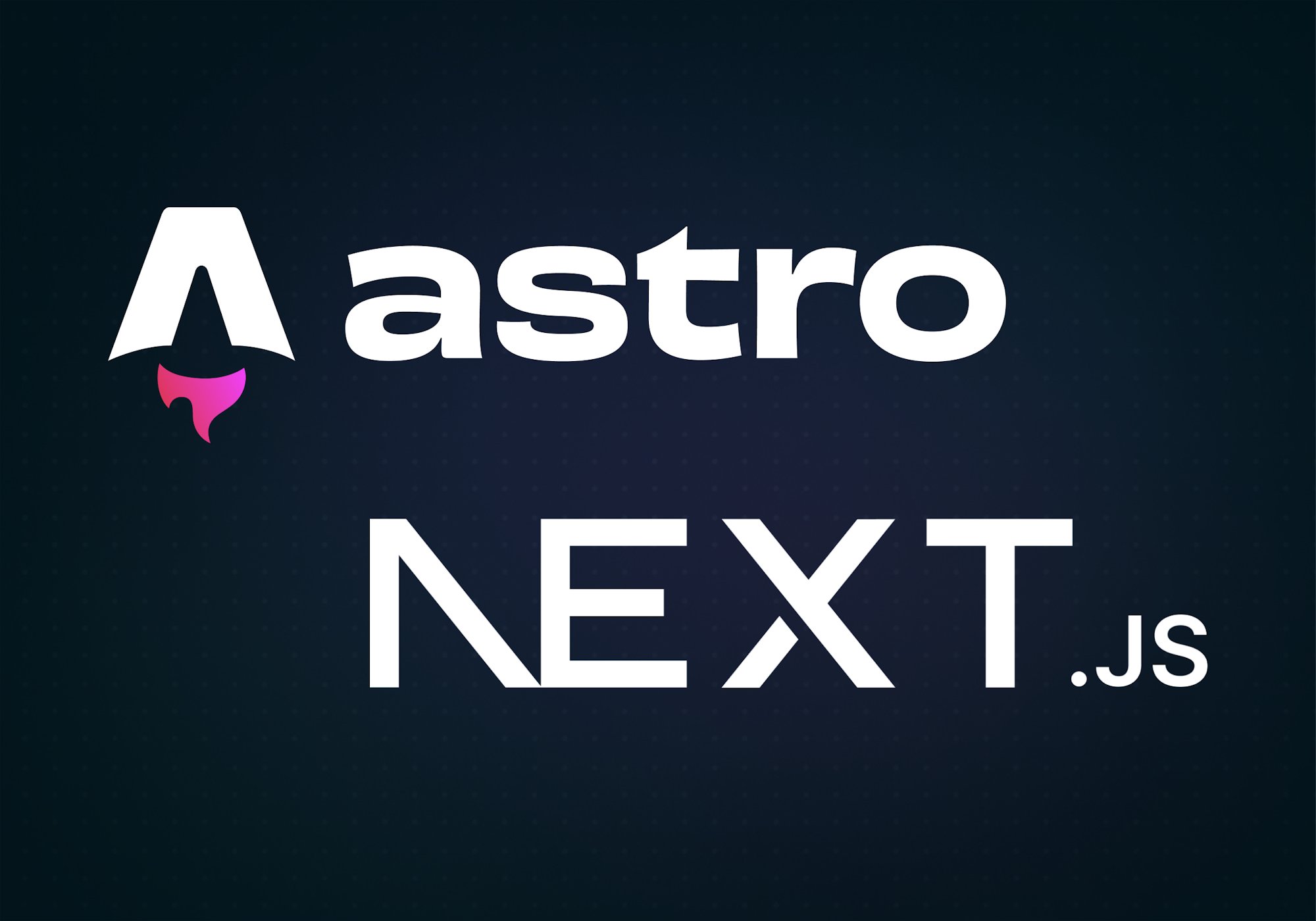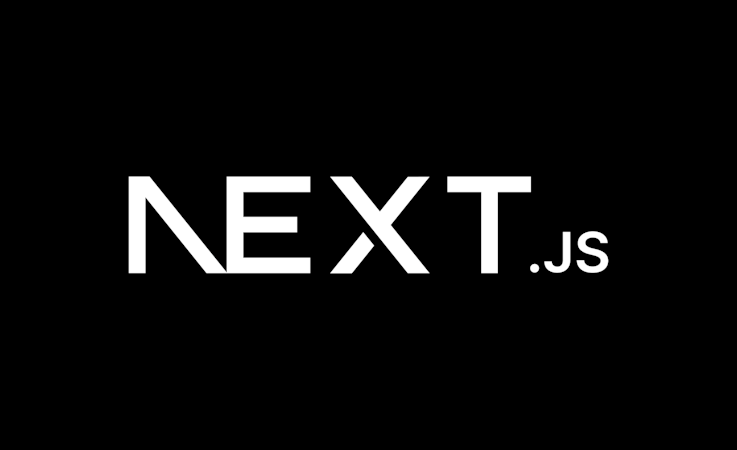
Tony Spiro
October 30, 2025

Next.js vs Astro: Choosing the Right Framework for Your Project
Choosing the right framework can make or break your web development project. To help you make an informed decision, we used the Cosmic AI Platform to build identical applications with both Next.js 16 and Astro, using the same natural language prompts and content structure. The results reveal distinct advantages for each framework depending on your specific needs and project requirements.
The Experiment: Same Requirements, Different Approaches
We created two complete web applications with identical functionality - showcasing content through posts, authors, and categories. The only difference was the framework specified in our prompts:
Next.js 16 prompt: "Build a complete application that showcases posts, authors, and categories. Include a modern, responsive design with proper navigation, content display, and user-friendly interface. Use Next.js 16."
Astro prompt: The same request, but specifying Astro.
Here are the results:
Key Differences We Observed
1. JavaScript Bundle Size and Performance
One of the most striking differences between the frameworks is their approach to JavaScript delivery and client-side interactivity.
Next.js 16 Profile:
- Full React runtime included in every page
- Efficient code splitting with shared chunks
- Hydration of interactive components on every page load
- Client-side routing for smooth navigation transitions
- Streaming with Suspense for progressive content loading
- 523 npm packages in production dependencies
Astro Profile:
- Zero JavaScript by default (ships only HTML/CSS)
- Selective hydration with Islands architecture
- Minimal client-side JavaScript only where needed
- Significantly smaller initial page weights (often 90%+ smaller)
- Progressive enhancement approach
- Multi-page application (MPA) architecture
- 478 npm packages (45 fewer dependencies than Next.js)
Winner for Performance: Astro delivers dramatically lighter pages out of the box, making it ideal for content-heavy sites where interactivity is minimal. Next.js provides more consistent performance across all pages but with a larger baseline bundle that enables richer interactions.
2. Build Performance and Speed
The build logs reveal important differences in how quickly each framework compiles and generates production-ready applications.
Next.js 16 Build Performance:
- Total build time: 41 seconds
- TypeScript compilation: 3 seconds (includes type checking)
- Production build: 4.2 seconds with Turbopack
- Static page generation: 1.6 seconds (10 pages)
- Page optimization and finalization: Sub-second
- 523 packages installed in 27 seconds
- Build cache: 103.75 MB
- Total deployment time: ~47 seconds
Astro Build Performance:
- Total build time: 45 seconds
- TypeScript checking: 3 seconds (via astro check)
- Content sync: 39ms (type-safe content collections)
- Static site generation: 4.45 seconds (11 pages)
- Vite build: 1.17 seconds
- 478 packages installed in 33 seconds
- Build cache: 42.45 MB (59% smaller than Next.js)
- Total deployment time: ~51 seconds
Winner for Build Speed: Next.js builds 4 seconds faster overall despite installing more dependencies. Both frameworks compile efficiently with Turbopack (Next.js) and Vite (Astro) providing fast, optimized builds. Astro's smaller build cache (42.45 MB vs 103.75 MB) results in faster cache uploads and reduced storage requirements.
3. Development Experience and Flexibility
Both frameworks offer excellent developer experiences, but with different philosophies that affect how you build.
Next.js 16 Development:
- Turbopack for lightning-fast builds (4.2s compilation)
- Hot module replacement for instant feedback during development
- Integrated TypeScript support with automatic configuration
- App Router with file-based routing conventions
- Built-in API routes for server-side logic and endpoints
- Full React ecosystem and component library access
- Middleware for request manipulation and authentication
- Edge runtime support for global performance
- Automatic telemetry for framework improvements
Astro Development:
- Fast dev server with instant page updates
- Component-agnostic architecture (use React, Vue, Svelte, Solid, or vanilla)
- Content Collections for type-safe content management (39ms sync time)
- Built-in Markdown and MDX support out of the box
- Simpler mental model for static-first sites
- Islands Architecture for surgical JavaScript inclusion
- Framework flexibility - mix and match UI frameworks
- Straightforward deployment to any static host
- Vite-powered builds for modern tooling
Winner for DX: Next.js edges ahead for complex, dynamic applications requiring real-time updates and full-stack capabilities. Astro wins for content-focused projects where simplicity, flexibility, and framework independence matter most.
4. Content Management Integration
Both frameworks integrate beautifully with Cosmic CMS, but their approaches differ significantly in how they fetch and render content.
Next.js Integration:
- Dynamic rendering with ISR (Incremental Static Regeneration)
- Server-side data fetching with async/await patterns
- Built-in image optimization with next/image component
- API routes for webhook handlers and custom endpoints
- Streaming with Suspense for progressive loading
- Server Components for efficient data fetching
- Automatic code splitting per route
- Built-in caching strategies with fine-grained control
- 1-minute revalidation with 1-year expiration
Astro Integration:
- Static generation at build time by default
- Content Collections for structured, type-safe content
- Automatic image optimization with astro:assets
- Framework-agnostic component integration patterns
- Simpler data fetching patterns with straightforward APIs
- Build-time content rendering for maximum speed
- Optional dynamic routes with server-side rendering
- Straightforward caching through standard HTTP headers
Winner for CMS Integration: Tied - both excel but serve different needs. Next.js provides more flexibility for dynamic content updates and real-time features, while Astro offers simpler patterns for static content with excellent performance characteristics.
5. Architecture and Scalability
The architectural differences significantly impact how your application scales and performs under load.
Next.js Architecture:
- Full-stack React framework with server and client capabilities
- Server Components for efficient rendering without client JavaScript
- Middleware for request manipulation and routing logic
- Edge runtime support for global performance optimization
- Complex caching strategies for sophisticated optimization
- API routes for backend functionality within the same project
- Monorepo-friendly with built-in module resolution
- Scales horizontally with Node.js or edge infrastructure
- App Router with dynamic routes and static generation
Astro Architecture:
- Multi-page application (MPA) by default for traditional navigation
- Islands Architecture for selective interactivity where needed
- Partial hydration reduces client-side overhead dramatically
- Static-first with opt-in dynamic features via adapters
- Simpler deployment requirements (can deploy as pure static files)
- Component framework flexibility (not locked into React)
- Explicit rather than magic - clear what runs where
- Scales efficiently for content-heavy sites with millions of pages
- Content Collections provide type safety and structured data
Winner for Scalability: Next.js scales better for interactive, application-like experiences with complex state management. Astro scales more efficiently for content-heavy sites with millions of pages due to smaller bundle sizes and simpler architecture.
6. SEO and Core Web Vitals
Both frameworks prioritize SEO and performance metrics, but achieve them through different technical approaches.
Next.js SEO Profile:
- Automatic metadata generation with App Router
- Server-side rendering for dynamic content crawlability
- Built-in sitemap generation capabilities
- Image optimization reduces Largest Contentful Paint (LCP)
- Good Core Web Vitals with proper optimization techniques
- Streaming HTML for faster Time to First Byte (TTFB)
- React hydration can impact Time to Interactive (TTI)
- Requires optimization effort to match static site performance
- Static generation with 1-minute revalidation for fresh content
Astro SEO Profile:
- Exceptional Core Web Vitals out of the box with minimal effort
- Zero JavaScript means faster Time to Interactive by default
- Built-in sitemap and RSS feed generation
- Perfect Lighthouse scores more easily achieved
- Superior performance on low-powered devices and slow connections
- Minimal Cumulative Layout Shift (CLS) with static rendering
- Faster initial page loads due to smaller bundle sizes
- Server-side rendering available when needed via adapters
Winner for SEO: Astro has a clear advantage for pure performance metrics and Core Web Vitals. Next.js can match Astro when properly optimized but requires more developer effort and expertise to achieve the same results.
Real-World Application Comparison
Design and User Experience
Both applications deliver polished, modern designs with excellent usability:
Next.js Application Highlights:
- Smooth client-side transitions between pages create app-like feel
- Interactive elements feel more responsive and "native"
- Rich animations and micro-interactions enhance engagement
- Consistent React component patterns throughout
- Loading states and optimistic UI updates
- Instant navigation with prefetching
- Dynamic content updates without page refreshes
Astro Application Highlights:
- Lightning-fast page loads with instant perceived performance
- Instant perceived performance on first visit
- Clean, accessible HTML markup
- Progressive enhancement approach ensures baseline functionality
- Zero layout shift during page loads
- Works perfectly with JavaScript disabled
- Faster on low-bandwidth connections
Content Editing Experience
Both integrate seamlessly with Cosmic's admin interface, providing identical content management capabilities:
- Real-time preview capabilities for editors
- Rich text editing with Markdown support
- Media management through Cosmic's optimized CDN
- Webhook support for triggering rebuilds automatically
- Scheduled publishing for time-based content
- Team collaboration features
- Version history and content restoration
Deployment Considerations
Next.js Deployment:
- Optimized for Vercel (same company) with zero-config deployments
- Deployed to Washington, D.C., USA (East) - iad1 region
- 4 cores, 8 GB build machine configuration
- Requires Node.js runtime for SSR features and API routes
- Edge runtime for global distribution and low latency
- More complex caching strategies requiring configuration
- Can be deployed to other Node.js hosting providers
- Higher memory requirements for server rendering
- 103.75 MB build cache requires more storage
Astro Deployment:
- Deploy anywhere (Netlify, Vercel, Cloudflare Pages, GitHub Pages)
- Deployed to Washington, D.C., USA (East) - iad1 region
- 4 cores, 8 GB build machine configuration
- Can deploy as pure static files to any CDN or file server
- Simpler hosting requirements and configurations
- Lower hosting costs for static sites (often free)
- Optional SSR adapters for dynamic functionality
- Minimal server requirements when using adapters
- 42.45 MB build cache (59% smaller) reduces storage costs
When to Choose Each Framework
Choose Next.js When:
You need a robust, full-stack framework with rich interactivity and dynamic capabilities:
- Building complex, interactive user experiences beyond basic navigation
- Your site requires authentication, user sessions, or personalization
- You need real-time content updates without full page rebuilds
- Your team is deeply invested in the React ecosystem
- You require advanced features like middleware, API routes, and server-side logic
- Building a hybrid site with both static and dynamic sections
- You need sophisticated caching strategies and performance optimization
- Server-side rendering is critical for your use case
- Faster build times are a priority (4 seconds faster than Astro)
Ideal Use Cases:
- SaaS applications with authenticated user experiences
- E-commerce platforms with dynamic pricing and inventory
- Real-time dashboards with live data updates
- Social platforms with user-generated content
- Complex multi-tenant applications
- Applications requiring extensive server-side logic
- Projects needing full-stack capabilities in one framework
Choose Astro When:
You prioritize performance, simplicity, and flexibility with minimal JavaScript overhead:
- Performance and page speed are your top priorities
- Your site is primarily static content with occasional interactivity
- You want minimal JavaScript overhead for better Core Web Vitals
- Your team uses multiple frontend frameworks or wants flexibility
- SEO and performance metrics are critical business requirements
- You prefer simpler deployment and hosting infrastructure
- Budget constraints favor lower hosting costs
- Framework independence is valuable to your team
- Smaller build cache (59% smaller) reduces storage and upload costs
- 45 fewer npm dependencies simplifies maintenance
Ideal Use Cases:
- Marketing websites and landing pages focused on conversion
- Documentation sites requiring fast search and navigation
- Portfolio and showcase sites highlighting work
- Content-heavy publications with thousands of articles
- SEO-focused content sites prioritizing organic traffic
- Company websites with mostly static pages
- Knowledge bases and help centers
- Projects requiring framework flexibility
The Cosmic AI Platform Advantage
What made this comparison particularly valuable was using the Cosmic AI Platform to generate both applications from identical natural language prompts. Both frameworks produced production-ready applications with:
- Complete component architectures following best practices
- Proper routing and navigation patterns
- Seamless Cosmic CMS integration out of the box
- Responsive, accessible designs meeting WCAG standards
- Optimized production builds ready for deployment
- Professional styling and user experience
- SEO-friendly markup and metadata
- TypeScript support with automatic type checking
- Console capture for debugging and monitoring
The platform's integration with GitHub and deployment providers meant both applications were live and accessible within minutes of generation, demonstrating the power of AI-assisted development.
Performance in Production
Both applications are live and demonstrate their respective strengths in real-world conditions:
- Next.js Application - Rich, interactive experience with smooth transitions and app-like navigation
- Astro Application - Exceptional speed with minimal JavaScript overhead and instant page loads
Build Time Comparison Summary:
Next.js 16:
- Total build time: 41 seconds
- Dependencies installed: 27 seconds (523 packages)
- TypeScript compilation: 3 seconds
- Production build with Turbopack: 4.2 seconds
- Static page generation: 1.6 seconds (10 pages)
- Build cache size: 103.75 MB
- Cache upload: 1.9 seconds
Astro:
- Total build time: 45 seconds
- Dependencies installed: 33 seconds (478 packages)
- TypeScript checking: 3 seconds
- Content Collections sync: 39ms
- Static site generation: 4.45 seconds (11 pages)
- Vite build: 1.17 seconds
- Build cache size: 42.45 MB (59% smaller)
- Cache upload: 1.0 seconds
Key Insights:
- Next.js builds 4 seconds faster overall despite more dependencies
- Astro's build cache is 59% smaller, reducing storage and bandwidth costs
- Both frameworks handle TypeScript efficiently
- Astro's Content Collections provide type-safe content in just 39ms
- Next.js uses Turbopack for faster compilation
- Astro uses Vite for modern, efficient bundling
- Similar deployment infrastructure (4 cores, 8 GB, iad1 region)
Migration Considerations
Moving from Next.js to Astro:
Advantages:
- Dramatically lighter pages and better performance scores out of the box
- Simpler mental model for content-focused sites
- Lower hosting costs with static output and CDN deployment
- Component flexibility (not locked into React ecosystem)
- Better Core Web Vitals scores with less effort
- Reduced complexity in build and deployment process
- 59% smaller build cache reduces storage costs
- 45 fewer dependencies to maintain
Challenges:
- Need to rebuild interactive features using Islands architecture
- Client-side routing requires additional setup and configuration
- React-specific patterns need adaptation to Astro paradigms
- Less mature ecosystem for some specialized use cases
- Limited real-time capabilities compared to full-stack frameworks
- Learning curve for developers deeply invested in React
- Slightly longer build times (4 seconds more)
Moving from Astro to Next.js:
Advantages:
- More powerful dynamic features and server-side capabilities
- Richer interactive possibilities with full React component model
- Better tooling for complex applications requiring state management
- Unified full-stack framework for API and frontend
- More extensive plugin ecosystem and community resources
- Advanced features like middleware and streaming
- Better suited for application-like experiences
- Faster build times (4 seconds quicker)
Challenges:
- Larger bundle sizes require careful optimization effort
- More complex caching and performance strategies to master
- Steeper learning curve for advanced features and patterns
- Higher hosting requirements and associated costs
- Performance optimization requires more expertise
- More moving parts and complexity to manage
- 103.75 MB build cache (2.4x larger) increases storage costs
- 45 additional dependencies to manage
Conclusion: Different Tools for Different Needs
The choice between Next.js 16 and Astro isn't about which framework is objectively "better" - it's about which better serves your specific project requirements, team expertise, and performance priorities.
Choose Next.js if you need:
- Rich, interactive experiences with complex state management
- Dynamic content and real-time updates without page reloads
- Full-stack application capabilities within a single framework
- Complex server-side logic, authentication, and API routes
- Advanced React patterns and extensive component ecosystem
- Sophisticated caching strategies and performance optimization
- Faster build times (4 seconds quicker than Astro)
Choose Astro if you prioritize:
- Maximum performance and minimal JavaScript overhead
- Exceptional SEO and Core Web Vitals scores with minimal effort
- Simpler architecture and deployment workflows
- Framework flexibility and component portability
- Lower hosting costs and infrastructure requirements
- Content-first development with static generation
- Smaller build cache (59% smaller) for reduced storage costs
- Fewer dependencies (45 less) for easier maintenance
Key Takeaways:
- Build Performance: Next.js builds 4 seconds faster; Astro has 59% smaller cache
- Dependencies: Astro uses 45 fewer packages (478 vs 523)
- Performance: Astro delivers lighter, faster pages by default with less optimization effort
- Flexibility: Next.js provides more dynamic capabilities and full-stack features
- Developer Experience: Both offer excellent DX, but optimized for different use cases
- Scalability: Next.js scales better for complexity and interactivity, Astro for content volume
- Cost: Astro typically costs less to host and maintain with simpler infrastructure
- Learning Curve: Astro is simpler for content sites, Next.js offers more power for applications
For teams using the Cosmic AI Platform, both frameworks deliver excellent results with minimal setup. The platform's ability to generate complete applications with either framework means you can experiment risk-free before committing to one approach for your production project.
Try It Yourself
Ready to compare Next.js and Astro firsthand with your own requirements?
- Explore the applications: Compare the Next.js and Astro implementations yourself
- Review the projects: Check out the Next.js Community Project and Astro Community Project
- Build your own: Use the Cosmic AI Platform to create applications with either framework
- Learn more: Explore Next.js documentation and Astro documentation for detailed technical specifications
The combination of modern frameworks with AI-assisted development creates unprecedented opportunities for building high-quality applications quickly. Whether you choose Next.js or Astro, the Cosmic AI Platform helps you ship faster while maintaining best practices for performance, SEO, and user experience.
Start building today with the framework that best matches your project needs and team expertise.
Continue Learning
Ready to get started?
Build your next project with Cosmic and start creating content faster.
No credit card required • 75,000+ developers




